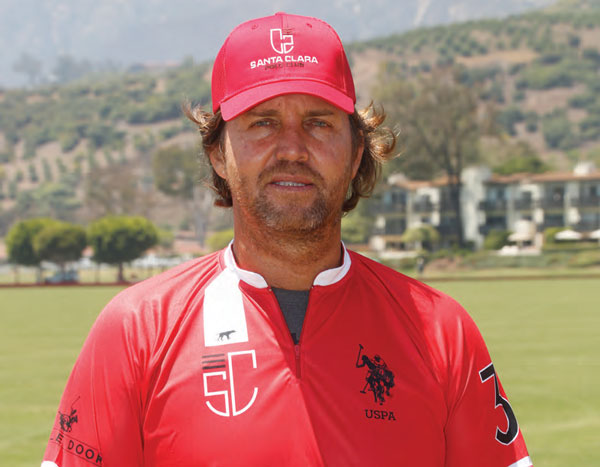Recognized as one of the world’s most skilled polo players to have ever raced across the pitch, Luis Escobar humbly opens up about his intense commitment to the game, unwavering devotion to family, and how his own father became the cornerstone of this dynasty.
Owned and operated by three generations of Escobars, Wellington, Florida houses an impressive 48
acres of land, which has earned an impeccable reputation as the Santa Clara Polo Club. Escobar briefly broke his stoic character when questioned about the origin of the club’s name.
“Well, my mom’s name is Clara, and my father knew that being married to him she had to have been a saint. That’s my best guess.”
The stunning property is one of the last family-run polo clubs accessible to the public. Cultivating a dynamic and hospitable atmosphere for both beginners and high-goal professionals to enjoy the game, Santa Clara distinguishes themselves by offering students high-level horses familiar with competition. Known for their well-maintained fields, Santa Clara relies on the expertise of Argentine specialist Alejandro Battro, who supervises the fields of Palermo.
Out of the saddle and into the hot seat, Luis Escobar details exactly how he materialized into one of the finest adversaries in the ‘sport of kings’.
“I lived in Costa Rica until I was 17 to finish high school, and after graduation in 1978, my parents brought the family to Wellington. We were supposed to have moved two years prior, but the area wasn’t developed yet, and was a far distance from our home. Even so, we still came to Florida every winter and spent the summers back in Costa Rica. I love playing polo, and traveling comes with the territory when you play professionally. By the time I had advanced enough in the sport that I was called to play in locations such as England, New York, California, Argentina, France, and Central America, I was very familiar with not staying put in one place. My dad always supported me in all my success. The only thing he was ever stern about, was that he still wanted me to finish my university studies. For me though, it was simple… since I was eight years old my mind was set on becoming a top polo player. I was invited at 15 to play high-goal polo, and already had exposure to it at that point, having been involved with the game for such a long time. After high school ended, I was tested out for a team
that decided to hire me that winter, but I remembered what my father said. I changed my major from architecture to business marketing, and relocated from Texas A&M to Florida Atlantic University so I could play polo while attending school. Every time I step onto that field, I feel that excitement spark, because you want to do the best job possible every time – even though it is a bit stressful competing. Even to this day – if I have a game, I get a little nervous while getting ready… but it’s a good nervous.”
Escobar’s father took the integral lead position when it came to molding his son into a polo virtuoso, and has been a prominent presence throughout his entire life.
“My father Francisco played for fun, and it’s the reason why we always came to Wellington. The Palm Beach Polo and Country Club had just opened its doors, and that’s where he wanted to be. I was seven and had begun riding to spend time with him. I loved it right away, and decided I would pursue the sport. When I’m not doing well, or my team is not doing well, I still hear him saying, ‘hey just enjoy it and play for yourself,’ and I still take that advice to heart.”
Even with safety precautions, polo has the potential to be a perilous sport, and players have even lost their lives during matches. Luis experienced misfortune first-hand, as he received a significant head injury in 2014 during a high-goal competition, posing a threat to his future.
“It was an accident that can happen to anyone while riding a horse. My teammate and I crashed on the field during a game, causing us to roll over and I hit my head pretty severely. Six months passed before I rode again, and a year passed before I could even play.”
Every equestrian athlete’s rank is evaluated and determined twice a year by the United States Polo Association (USPA), with a 10-goal handicap given as the highest achievable classification. One player to receive such a ranking is Gonzalo Pieres, who Escobar holds in high regards.
“I reached a career-high eight-goal ranking in 1997, remaining at that level until 2005, and then dropped to a seven-goal until 2013. After my unfortunate traumatic brain injury, I was considered a five-goal. Currently, my age has caught up to me, so I don’t play as much… making me a four-goal competitor. Pieres was one of my mentors and someone I have looked up to for a long time. I was invited to play for Peter Brandt on his team White Birch, and Pieres was one of their main professionals. He is a polo legend who taught me a lot about the game, and is still one of the biggest breeders in Argentina.”
Athletes at the apex of a winning career often have a strict routine they adhere to.
“The night before, without a doubt – although after the pandemic it changed a bit – but before the game I like to go to the movies, and clear my mind. After the movies, I make time for a great dinner and review my strategies for the next day.”
Escobar has handed over the mallet to his two sons, Lucas and Nico, who are determined to carry on the lineal legacy, and are readily doing so by distinguishing themselves as forces to be reckoned with in their own right. They look to their father Luis, who offers his progeny a dedicated instructor and guide. “Polo is a family pastime, and probably why I still have such a good relationship with my dad… he’s 78 and continues to play to this day. I’m currently here in England with my sons at their matches because family support is very important to me. Polo is a sport where you not only have to learn the actual game, but need to acquire an extensive understanding about the horses, and that takes generations to get really good at. I’m second generation, and my children are third, so hopefully they’ll keep it going. The best part of all of this, is the way knowledge is transferred… by spending time with family and being near your kids.”
Escobar has an impressive resumé, having won every tournament in the United States and most cups 22-goal level and below, including the Monty Waterbury Cup, which has a designation as one of the most prestigious Polo tournaments.
“I played in Argentina in the Cámara de Diputados Cup, which is a high-goal tournament held at the same time as the Open. Although we lost in the finals by a goal, that was one of the great moments of my career. There’s not one single highlight because every match means so much, but the America Cup which I won six times stands out for me. The Pacific Coast Open in Van Nuys, California was amazing, and I was able to win twice there. I also love being in Santa Barbara, which has always been a great place for the summer tournaments.”
Polo is known as the Gentleman’s Sport, but if one is serious about becoming a professional, Escobar recommends becoming immersed in polo culture as soon as possible.
“The earlier you can start playing the better… the younger a person is, the easier it will be to gain the necessary skills. Taking riding lessons is key, so I would suggest riding as much as you can. The horses without a doubt are the greatest aspect of the game, and currently at Santa Clara we have about 100 playing at different levels. It is quite the long process priming and getting them ready to play. It takes three to four years to bring a horse from green, which is not knowing anything, to qualifying for a tournament.”
While many polo clubs come and go, Santa Clara has been around since 1983, and continues to be a shining example of how a family-owned establishment can flourish when truly cared for.
“Polo is absolutely time-consuming, but it’s my purpose and most definitely a lifestyle – one which I hope my sons will carry on and love as much as I do.”
To learn more about Luis Escobar and Santa Clara Polo Club, please visit www.santaclarapoloclub.com



